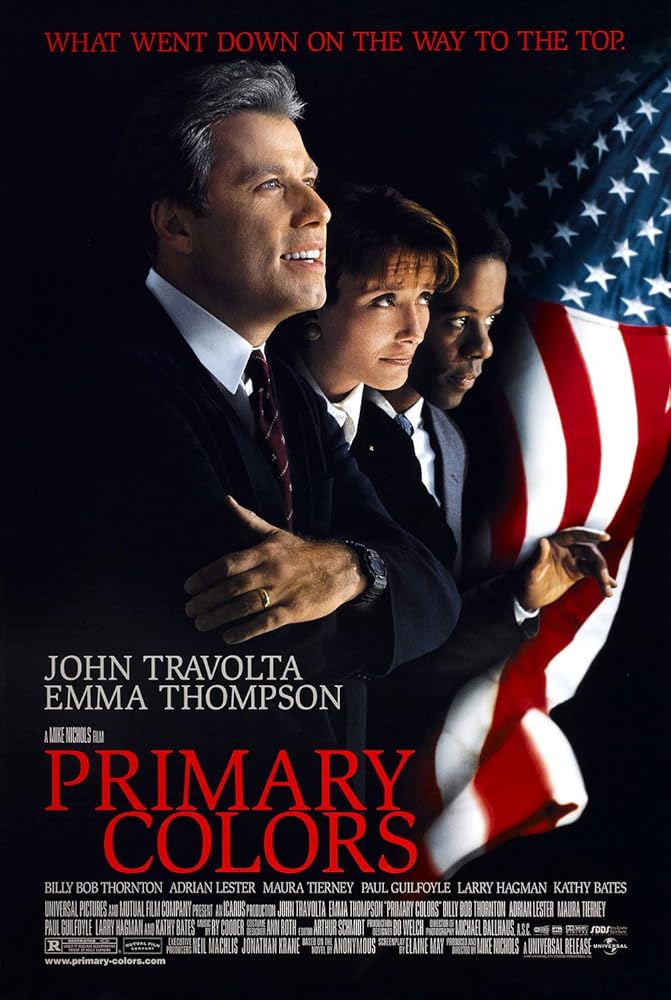
PRIMARY COLORS
(director: Mike Nichols; screenwriters: Elaine May/based on the novel by Anonymous (Joe Klein); cinematographer: Michael Ballhaus; editor: Arthur Schmidt; music: Ry Cooder; cast: John Travolta (Gov. Jack Stanton), Emma Thompson (Susan Stanton), Billy Bob Thornton (Richard Jemmons), Kathy Bates (Libby Holden), Rob Reiner (Izzy Rosenblatt), Adrian Lester (Henry Burton), Rebecca Walker (March); Runtime: 143; MPAA Rating: R; producer: Mike Nichols; Universal; 1998)
“The film owes a few doggie bones to “Wag the Dog,” which came first in pointing out what Primary Colors only seconds.“
Reviewed by Dennis Schwartz
Primary Colors is the fictionalized story of an opportunistic, manipulative and womanizing populist liberal Southern governor presidential candidate, who is helped immensely in his career moves by his ambitious, savvy, strong-willed but emotionally vulnerable wife. Obviously a sketch of President Clinton and his wife Hillary, but using different names. It’s written by Elaine May and is based on the Newsweek reporter Joe Klein’s sprawling controversial 1996 novel on the 1992 Clinton presidential campaign, that in its underhanded way offers an apology for Clinton’s sexual discretions and other foibles to make him out as a man of the people who despite his faults wanted to do good for the common man. Mike Nichols (“Heartburn”/”Silkwood”/”Postcards from the Edge”) smartly directs it, as he takes a knowing look at American politics and exposes it for what it is without being unduly cynical; in fact, ending it on a cautiously optimistic note. However the satire is ineffective, as it has no bite and it’s only adequately performed in fits and starts by the talented cast (John Travolta grays his hair and offers a sympathetic but uncharismatic less than true impersonation of Clinton). Though the story is relevant and at times quite amusing, it stubs its toe further when at the halfway point it introduces an unrealistic drama that takes the film off target from the dark portrait it paints of the American political process. It leaves it to the viewer to ponder what effects such dire consequences over corruption have for the country and the democratic process, but the film lacks the book’s edge and it never feels like you’re given an authentic first-hand look at the political campaign.
Democratic Governor Jack Stanton (John Travolta) is a personable good ol’ boy from an unnamed Southern state who runs for president and convinces Henry Burton (Adrian Lester, British actor), the bland skeptical African-American political strategist who is the grandson of a respected civil rights leader and the film’s narrator, to be his deputy campaign manager because they share the same idealism. Henry’s black activist girlfriend (Rebecca Walker) dumps him for this decision.
Stanton’s outspoken frank wife Susan (Emma Thompson) proves to be a valuable asset during the campaign, as does his political adviser and crony Richard Jemmons (Billy Bob Thornton)–a fellow southerner and shrewd tactician who thinks that the candidate’s womanizing is the only thing that can stop his election plans.
When the campaign is in shambles, Libby Holden (Kathy Bates), a chubby lesbian and a friend of the family with important political ties, is brought into the fray to straighten out the direction of the faltering campaign and becomes the film’s moral compass and its most endearing heart-felt character. The campaign digs up dirt on Stanton’s able Democratic rival, the governor of Florida, Fred Picker (Larry Hagman), uncovering that in the past he was a cocaine-addicted homosexual and now must decide whether it’s morally advisable to go public with such dirt in order to win the nomination.
The film, a slick Hollywood mainstream vehicle, strikes a curious balance between political critique and entertainment; and though it fails to leave a lasting impression and lacks drama, it at least makes a few dents on the political process and the American cultural scene. It asks the right questions that demand answers about how much leeway will we grant to a likable politician who has too often fooled us and who is a flawed character but truly believes what he preaches (which might or might not be an accurate representation of Clinton, depending on one’s personal beliefs). But, its answers are smug and hardly convincing. The film owes a few doggie bones to “Wag the Dog,” which came first in pointing out what Primary Colors only seconds.
REVIEWED ON 11/3/2008 GRADE: C+